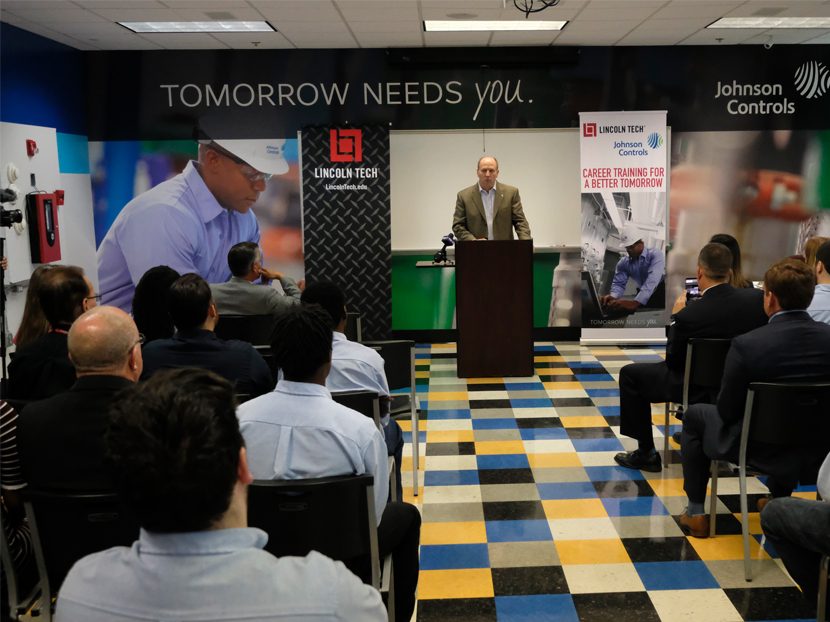Johnson Controls Partners with Lincoln Tech to Train Next Generation
Plans are to open 10 classrooms in key locations throughout the national trade school's campuses.

In order to fill millions of tech jobs needed to guarantee a productive HVAC industry for decades ahead, Johnson Controls recently partnered with Lincoln Tech to provide career opportunities for students of the nation-wide vocational college’s HVAC and electric systems training programs at 10 locations.
“We hear a lot about the skills gap and labor shortage that organizations in technical industries like building automation are facing today and in the future," Rod Rushing, president of building solutions, North America, for Johnson Controls, said at the opening of a new classroom in suburban Chicago. “To ensure there is enough talent to keep innovation thriving in the automated buildings industry and to continue solving new customer challenges around automation, security, and sustainability, we need to attract more people into the field and provide them with the training and education needed to be successful in their career.”
Johnson Controls, a manufacturer of HVAC products as well as an installer and servicer of those products, feels the labor shortage affecting the industry more than most, Al Young, vice president, field service and installation operations, North America, at Johnson Controls, told us after the Melrose Park, Illinois, and Indianapolis, Indiana, openings.
In the past year, the company added around 300 new technical roles in North America and the company needs to add significantly more to meet demand to not only sustain, but grow its business.
“It’s reported that more than two million technical roles could go unfilled due to the lack of skilled workers,” he adds. “Meanwhile, the industry itself is booming and busier than ever. For instance, the Bureau of Labor Statistics predicts demand for more than 100,000 new HVAC specialists in the coming years.”
New generation
To meet the need, Johnson Controls’ partnership will start at the beginning to introduce a whole new generation of young people to a career in the trades.
The basis behind the education plan is a natural, Young adds, since both are essentially local companies.
“Lincoln Tech has a local footprint around the country that we like,” Young says. Thanks to its multiple locations, Lincoln Tech can provide a classroom nearby where Johnson Controls needs to leverage itself to provide service for its national customer base.”
Johnson Controls has three main reasons for developing the partnership with Lincoln Tech, according to Young.
First and foremost, it will provide career opportunities to graduates of Lincoln Tech’s HVAC and Electrical and Electronic Systems Technology training programs. Upon completion of HVAC and electrical systems curriculums at Lincoln Tech, students will have an opportunity to pursue careers with Johnson Controls.
Granted, it’s one way for the company to hire the talent it needs ASAP, but company officials also say it will open up the students’ knowledge of the building trades industry overall.
Second, the added cache of the Johnson Controls global brand, plus HVAC equipment donated by the internationally known company to the classrooms should help attract more young people into the industry.
“We have around 90 high school representatives who go around the country into the schools and explain career opportunities to people about the industries we train for,” said Lincoln Tech President and CEO Scott Shaw at the opening of the Melrose Park, Illinois, classroom. “By being able to partner with Johnson Controls we believe that will help the whole industry attract more people into these fields.”
Third, Johnson Controls and Lincoln are developing curriculum that will provide Lincoln students with specific skills and knowledge to repair and maintain Johnson Controls equipment in the field.
Young adds that his company “pressure-tested” the curriculum and that the five-day-a-week coursework perfectly suits students for the everyday work life ahead.
“We want to build a pipeline of techs and have them understand emerging technology,” Young says. “Johnson Controls prides itself on providing operational excellence so it falls directly in our wheelhouse to train, recruit and certainly retain techs.”
In addition to the Illinois and Indiana locations, three more classrooms in East Windsor, New Britain and Shelton, Connecticut are expected to open this month. Classrooms in Columbia, Maryland; Denver; Mahwah and Union, New Jersey; and Marietta, Georgia will follow.
While Johnson Controls may need no introduction, Lincoln Educational Services Corp. is a provider of diversified career-oriented, post-secondary education. Lincoln offers recent high school graduates and working adults career-oriented programs in five principal areas of study: automotive technology, health sciences, skilled trades, business and information technology, and hospitality services. Lincoln has provided the workforce with skilled technicians since its inception in 1946.
Lincoln currently operates 23 campuses in 14 states under four brands: Lincoln Technical Institute, Lincoln College of Technology, Euphoria Institute of Beauty Arts and Sciences, and Lincoln College of New England.
“Having the support of an employer like Johnson Controls will prove to be invaluable for our graduates who can connect with a company that’s really defined the fields of climate control and energy efficiency for more than a century,” Shaw added. “Johnson Controls was paving the way in these arenas long before the fields were even being thought about as critical to our environment and our world. Now, as Johnson Controls continues its drive toward the development of ‘smart’ cities, built around integrated infrastructure, it’s exciting to know that our students can one day be a part of it.”
The partnership with Johnson Controls comes less than two months after Lincoln Tech announced it had also partnered with Hussmann Refrigeration. Together, these two relationships will afford Lincoln students a wide range of career possibilities after graduation.





